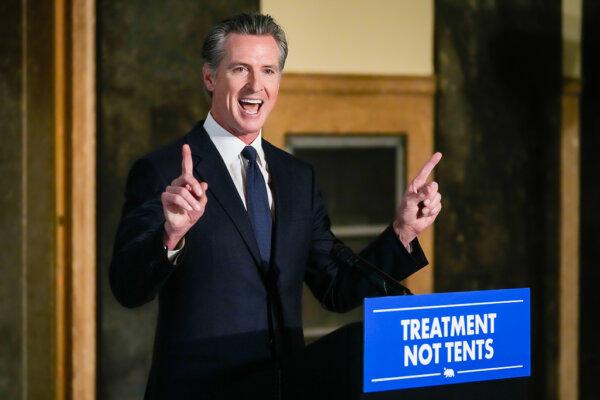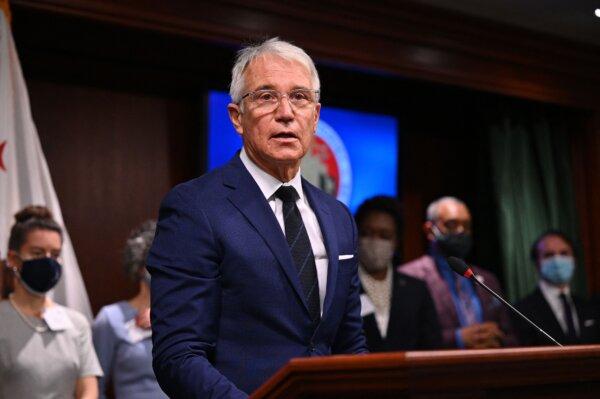Californians are torn on Proposition 1—Gov. Gavin Newsom’s mental health funding overhaul.
California’s primary elections coincided with the largest contest so far in the 2024 presidential race on Super Tuesday, giving observers a first glimpse of the contentious national election year ahead.
Key race results as of Tuesday night included U.S. Representative Adam Schiff and former Los Angeles Dodgers star Steve Garvey heading to the general election in November to fight for Diane Feinstein’s old Senate seat.
Based on preliminary results as of 1:16 a.m. Wednesday, Californians are torn on Proposition 1, as 50.7 percent of voters approved Gov. Gavin Newsom’s mental health funding overhaul. Los Angeles County District Attorney George Gascon will face former U.S. Attorney Nathan Hochman in the general election. Additionally, it appears LA County Supervisor Kathryn Barger will retain her seat, and Supervisor Janice Hahn was able to fend off former Sheriff Alex Villanueva.
Los Angeles County has more than 5.6 million voters, but historically low turnout was expected throughout the state, and polls forecasted an older and more conservative turnout than usual in deep-blue California. As of Tuesday midnight, Los Angeles County reported 779,729 ballots had been processed.
In a crowded race for the highly coveted U.S. Senate seat held by Dianne Feinstein from 1992 until her death last year, Adam Schiff, who represents California’s 30th congressional district in the U.S. House of Representatives, and Mr. Garvey, a Republican, will advance to the general election in November.
Though Mr. Schiff is leading with 33.8 percent, as of 1:12 a.m. Wednesday, for the full term—which starts in January 2025—Mr. Garvey prevails with the same percentage for the partial term.
Fellow Democrat Katie Porter and late-comer GOP candidate, former Los Angeles Dodgers star Steve Garvey, were vying for second place. But by Friday, a poll from the UC Berkeley Institute of Government Studies had Mr. Garvey leading Mr. Schiff 27 percent to 25 percent. Mr. Garvey’s campaign offered what he called a “commonsense” alternative, attacking Congressional Democrats on immigration, law enforcement, housing, and economic issues and appealing to California’s Latino and working-class constituents.
“Welcome to the California Comeback,” Mr. Garvey told reporters after the polls had closed Tuesday night.
“What you are all feeling tonight is what it’s like to hit a walk-off home run, kind of like San Diego in ‘84,” he said, referring to his iconic, game-winning home run for the Padres in the National League Championship Series.

Meanwhile, several high-profile Democrats—including state Assemblywoman Laura Friedman, State Sen. Anthony Portantino, and former Los Angeles City Attorney Mike Feuer—were among 10 candidates vying for Schiff’s House seat, which is based in Burbank, in a district that stretches from Pasadena and the Angeles National Forrest to Echo Park and West Hollywood.
And while Ms. Friedman led with 28 percent Tuesday midnight, surprise came in the form of Republican candidate Alex Balekian, an emergency medicine physician from Glendale who garnered slightly over 20 percent, putting him in second place.
“I am proud to spearhead a grassroots movement that has escaped the attention of the mainstream media but has summarized the universal malaise that represents the person on the ground in our district,” Mr. Balekian told The Epoch Times in a statement Tuesday night. “We do not like the career politicians who have dominated the discourse, and we look forward to electing citizen-legislators who espouse term limits and common-sense laws that encourage the small-business culture of immigrants in this district.”
Mr. Balekian campaigned on parental rights, fiscal conservatism, immigration, and public safety and took a strong line on homelessness in a recent debate, saying, “As a physician in Congress, I will solve this crisis by treating it as the mental health and drug addiction crisis that it is.”
The campaign’s tagline, “Treatment not Tents,” appealed to voters’ feelings about the state’s homelessness problem, which continues to swell despite the spending of $20 billion to solve the crisis over the past several years.

Supporters framed Prop. 1 as an urgent pivot toward prioritizing the “sickest of the sick” and finally putting a dent in the gaping need for housing and treatment. Opponents, including mental health professionals and county leaders, argued it would raid existing services that keep vulnerable residents from falling into homelessness, addiction, and severe mental illness and give the state a blank check to double down on failed policy.
The governor and his allies raised more than $26 million to promote the measure, crushing the opposition, which raised only $1,000.
It also appears incumbent Los Angeles County District Attorney George Gascón will face off in November against former U.S. Attorney Nathan Hochman. Mr. Gascon was leading in that race with 22 percent of the vote, compared to Mr. Hochman’s 18 percent.
Mr. Gascón was quoted by the Los Angeles Times before the election day saying the primary has been “arduous” and “very heavily contested.”
While violent crime was down slightly in 2023 over the previous year, according to LAPD, violent crime was significantly higher in 2023 than in 2020—Mr. Gascón was sworn in on Dec. 7, 2020—and property crimes have increased every year of his term, by a total of 24 percent, and shoplifting is up 81 percent over the past year alone, opponents argued.

“Tonight, three-quarters of Angelenos rejected George Gascón and said ‘enough is enough’ of playing politics with our communities’ safety,” Mr. Hochman, who placed second as of Tuesday midnight, said in a statement, calling it an end to ‘the Golden Age of Criminals.’”
“I look forward to restoring trust with prosecutors, a partnership with law enforcement, and credibility with victims and the public,” Mr. Hochman said.
“This is a momentous win for safer roads,” Damian Kevitt, Executive Director of Streets Are For Everyone (SAFE), an advocacy group that supported the measure.
“What’s amazing is this is an example of how democracy actually works. Measure HLA was not won by big corporations or vested interests. It was won by parents who were concerned about the safety of their children… It was won by pedestrians knocking on doors and cyclists delivering campaign signs. And it was won by family members who have personally lost a loved one due to traffic violence,” Mr. Kevitt said.
Incumbents in LA County Supervisor Districts 2, 4, and 5 outspent and defeated their challengers.
Vying for her third and final term, incumbent Kathryn Barger faced four opponents for District 5, led by Assemblyman Chris Holden from Pasadena. A moderate Republican, Ms. Barger aligns with her more progressive counterparts on many issues.
Mr. Holden’s campaign highlighted Ms. Barger’s connections to former President Donald Trump donors and painted her as a MAGA Republican on abortion, immigration, and gun control, but Ms. Barger racked up endorsements from Planned Parenthood, the Sierra Club, law enforcement, and unions.
By Tuesday midnight, Ms. Barger had garnered 60 percent of the vote, with Mr. Holden a distant 22 percent.
In District 4, incumbent Janice Hahn also had more than 60 percent, fending off challenges from former LA County Sheriff Alex Villanueva and Rancho Palos Verdes Mayor John Cruikshank.
And incumbent Holly Mitchell far outpaced challengers with more than 67 percent in the 2nd District.
Former President Donald Trump received 77.8 percent of the California Republican vote, as of Tuesday midnight, and trounced former governor of South Carolina Nikki Haley in more than a dozen key GOP primaries, including Virginia, North Carolina, and Texas, among others.
Original News Source Link – Epoch Times
Running For Office? Conservative Campaign Consulting – Election Day Strategies!


